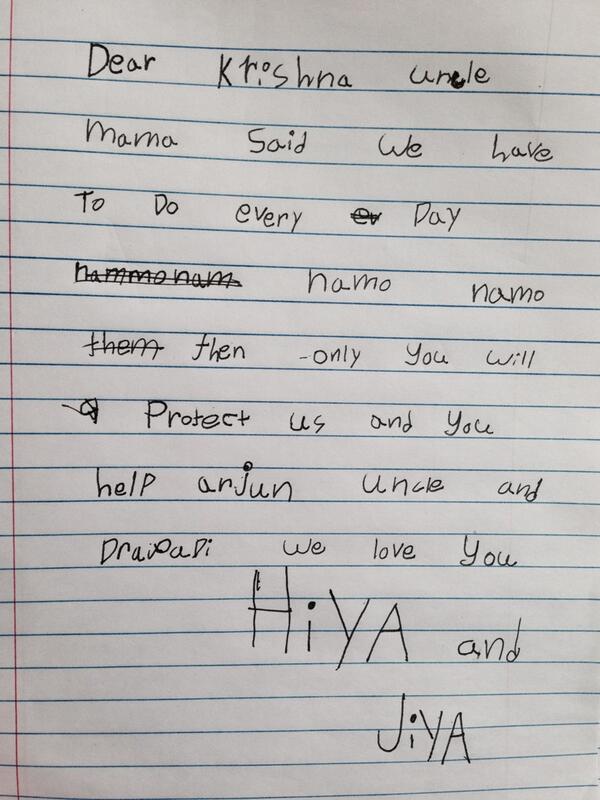Article found online:
THE REAL SLAVERY In mythology, Draupadi's disrobing will go down as one of the most brazen acts committed on a woman.
Somehow, everything about this episode seems abnormal, indigestible and most of all, incredible. What was Ved Vyas trying to convey?
The horrendous humiliation of a menstruating woman in a courtroom full of testosterone; the utterly impotent behaviour of not one, but five of her husbands, known to be the bravest, strongest and most decent of the Aryan lot; the extent of Yudhishtir's gullibility; the insanity to accept a second invitation; the cold silence of wise old men; and also Karna's dharma-quoting to egg on the disrobing. What happened to everyone? This was the one incident where almost everyone behaved completely out of character.
There is an alternate belief that the disrobing did not happen at all, but was a later addition to add spice to the drama. They also conclude that Krishna's saviour act must have been a Vaishnavite addition to promote his divine status.
This essay is not to prove or disprove what happened. We are all free to believe what we want to. I put aside my personal belief on this.
But there is one truth that glares out from this episode, and that truth glares irrespective of whether the disrobing happened or not.
I believe that Ved Vyaas wanted us to see this truth.
He showed the sheer stupidity of getting oneself knotted up in elaborate dharma. Every other person was yelling the word "dharma" but it was the most adharmic day in the history of the Kurus. Even the wisest among men allowed themselves to be muted by clever rule twisting; everyone was hanging his head in confusion and helplessness; everyone was suffering from "ethical dilemmas"; and everyone's heart and inner voice was screaming what was right and what was wrong. But no one listened.
Yudhisthir should not have accepted to play, certainly not the second time. But even after smelling deceit, he tied his hands with dharmic protocol. The brothers should have protected their wife, but were shackled by the rules of the game. Bhishma should have stopped the nonsense but could not clinch a solid cerebral argument - because he was stuck to the "written dharma".
The irony was that adharma happened under the cloak of dharma.
The good guys could not stop real adharma because of pseudo dharma. The bad guys had an adharmic field day, under the protection of pseudo dharma.
What comes out slapping on the face is this: that there is a limit to how far rules can take you. You can't let rules - well - rule you! It is as simple as that! Perhaps the incredulous-ness of this even was intentional. I think this was the point of it all - to show how much of a mess can be made when good people don't think beyond rules, and bad people manipulate the rules.
Vyas showed two kinds of slavery. One was the slavery of the Pandavas resulting from losing the bet. But the real slavery was their blind clinging to rules that do not serve a higher morality. This ended up allowing the lowest human behaviour possible.
Dharma is a double edged sword. It is nectar if followed with intelligence, but poison if clung onto stupidly.
This was the mindset that Krishna's reversed.
The Kauravas manipulated rules to win a kingdom they neither earned nor deserved. Krishna manipulated rules against the original manipulators to get back a kingdom that was built with blood and sweat.
The Kauravas dared to quote dharma to disrobe a woman. Krishna used the power of love to restore her dignity. Holding such precarious dharma as sacred is stupidity. Love alone is sacred.
Krishna made some very bold statements during the Vastra Haran episode. One - he was conspicuously absent. Two - he saved Draupadi as soon as she surrendered to him. He did not at that moment leaf through a rule book and wonder if it would be appropriate to intervene.
Even if we assume that the disrobing did not happen and Draupadi was only verbally humiliated, his stand remains the same. He said clearly, "If I was there I would not have let this happen".
He was the only man that day, even though he was not even there. Not Bhishma, not the Pandavas, and not Karna, even if he had remained silent - because he too did not even try to stop the madness.
Krishna was the only one who didn't give two hoots for written dharma when it clashed with the inner voice of morality.
Champa
Source:
Click Here...


